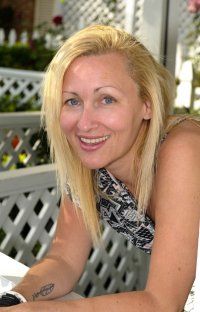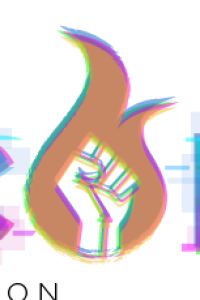Sarah Pinborough: Beyond Horror
 Sarah Pinborough was born in Stony Stratford, Buckinghamshire, England. Her father was a career diplomat, and she lived abroad in Syria, India, the Sudan, Moscow, and elsewhere as a child. She spent ten years in British boarding schools, ‘‘did lots of bad things’’ in her twenties (including running table-dancing clubs in London), was briefly married, and trained to be a secondary school teacher. From age 30 she spent six years teaching at schools in Bedfordshire and Buckinghamshire before becoming a full-time writer.
Sarah Pinborough was born in Stony Stratford, Buckinghamshire, England. Her father was a career diplomat, and she lived abroad in Syria, India, the Sudan, Moscow, and elsewhere as a child. She spent ten years in British boarding schools, ‘‘did lots of bad things’’ in her twenties (including running table-dancing clubs in London), was briefly married, and trained to be a secondary school teacher. From age 30 she spent six years teaching at schools in Bedfordshire and Buckinghamshire before becoming a full-time writer.
Her first publication was horror story ‘‘Express Delivery’’ in 2001. Other notable short fiction includes British Fantasy Award winner ‘‘Do You See’’ (2008), World Fantasy Award finalist ‘‘Our Man in the Sudan’’ (2008), British Fantasy Award nominee ‘‘The Confessor’s Tale’’, and British Fantasy Award winner and Shirley Jackson Award finalist novella The Language of Dying (2009).
First novel The Hidden (2004) was one of six horror novels published in rapid succession by Leisure Books, including The Reckoning (2005), British Fantasy Award finalists Breeding Ground (2006) and The Taken (2007), Tower Hill (2008), and Feeding Ground (2009). Pinborough moved away from straightforward horror with her cross-genre crime/horror/SF trilogy The Dog-Faced Gods, which includes A Matter of Blood (2010), The Shadow of the Soul (2011), and forthcoming The Chosen Seed (2012). As Sarah Silverwood she writes the Nowhere Chronicles YA series, set in a magical London: The Double-edged Sword (2010), The Traitor’s Gate (2011), and forthcoming The London Stone (2012). She has a secret-history thriller duology, Mayhem and Murder, forthcoming as well.
She has also written two tie-ins for the Torchwood TV series, Into the Silence (2009) and Long Time Dead (2011), and writes for BBC crime program New Tricks.
Pinborough lives in Milton Keynes, Buckinghamshire, England.
Excerpts from the interview:
‘‘When I worked as a teacher, I had this wonderful idea that I would write in the morning, and then in the afternoon I would sip red wine and read works of great importance, watch movies, and have this lovely relaxed life! But you end up just doing all work, all the time. Unless you get that big, half-million-pound deal, it’s very hard to say ‘no’ to anything that comes along, so you just end up working harder. It’s like a treadmill.
 ‘‘It’s very strange, because if you had to choose a genre to write in it wouldn’t be horror – there’s no money in it! But I’ve always been scared of everything. As a kid, I was scared of things under the bed and things in the cupboard, and I had bad dreams. When I was about eight and in boarding school, they had a bookshelf with all these paperbacks, and there were a lot of the Pan Books of Horror. I found myself reading those, and Dracula, and Stephen King. The Stand just blew me away, so all-encompassing, but without the overt sort of monsters – where there are big rats, and the rats are coming to get you.
‘‘It’s very strange, because if you had to choose a genre to write in it wouldn’t be horror – there’s no money in it! But I’ve always been scared of everything. As a kid, I was scared of things under the bed and things in the cupboard, and I had bad dreams. When I was about eight and in boarding school, they had a bookshelf with all these paperbacks, and there were a lot of the Pan Books of Horror. I found myself reading those, and Dracula, and Stephen King. The Stand just blew me away, so all-encompassing, but without the overt sort of monsters – where there are big rats, and the rats are coming to get you.
‘‘As a writer you often start off by emulating what you like to read, and I think the Leisure books came out of that. As I’m finding my own way, I still like imagining there’s a Narnia behind the cupboard. I think the real world is more scary than a scary fantasy world, so I’d rather make things up that have an edge. Even with scary magic, there’s something else appealing there. I don’t think I’ll ever write strictly straight horror again, though.”
…
“My adult series The Dog-Faced Gods is the story of a man called Cass Jones. In some respects, he’s a very typical hard-bitten policeman who has something in his past that has endangered him. He lives on that line between right and wrong, which I think is more interesting than being clearly good or bad. While investigating several crimes (serial killings and mass suicides and terrorism, over the course of three books) in this economically depressed near future, he uncovers a shadowy group called The Network. I hesitate to use the word ‘supernatural’ to describe the trilogy, other than in its true meaning – ‘out of the ordinary’ – because to me it’s more of a science fiction series, where I rewrite the history of the world and say bad things about God!
 ‘‘The series is set in the near future, after a worldwide financial collapse. I was quite naive about world affairs before I began researching the book. I hadn’t realized what a shitty position the world was in, until our High Street Banks in England started to fold, and I suddenly realized all those systems are connected. The American problems are our problems; our problems are their problems. So part of what the trilogy is about is the big banks and how they’ve totally screwed us over. At first I blamed ordinary people living on credit, and then I saw what the banks were doing and thought, ‘There’s more to this. God, we are on the verge of collapse!’ I wanted to write about a world where all the worst-case scenarios came to pass. I didn’t want to make it too futuristic, because then it would become clearly science fiction, but I could play around with things like a new strain of AIDS…”
‘‘The series is set in the near future, after a worldwide financial collapse. I was quite naive about world affairs before I began researching the book. I hadn’t realized what a shitty position the world was in, until our High Street Banks in England started to fold, and I suddenly realized all those systems are connected. The American problems are our problems; our problems are their problems. So part of what the trilogy is about is the big banks and how they’ve totally screwed us over. At first I blamed ordinary people living on credit, and then I saw what the banks were doing and thought, ‘There’s more to this. God, we are on the verge of collapse!’ I wanted to write about a world where all the worst-case scenarios came to pass. I didn’t want to make it too futuristic, because then it would become clearly science fiction, but I could play around with things like a new strain of AIDS…”
…
‘‘I think the places I lived early on influenced me as a person more than as a writer, but I’ve used those travel experiences in a lot of my short stories. We lived in Khartoum when I was a child, so I used that whole experience in ‘Man of the Sudan’. My time spent in boarding school also influenced my writing, but not in a direct way. Yet traveling is like reading, isn’t it? The more you read, the more you experience of the world, and the more you travel, the more you experience of the world. (I do love reading and try to do an hour a day, but it seems to become a chore when the work mounts up!)”






Pingback:SF Tidbits for 3/19/12 - SF Signal – A Speculative Fiction Blog
Good example of how most people really don’t know how bad things are with the global economy until they do some research, it’s looking really grim and I think a fiction set after this sort of financial meltdown is an interesting angle that hits close to home with everyone in this day and age. I think I’ll give Ms. Pinborough a read.